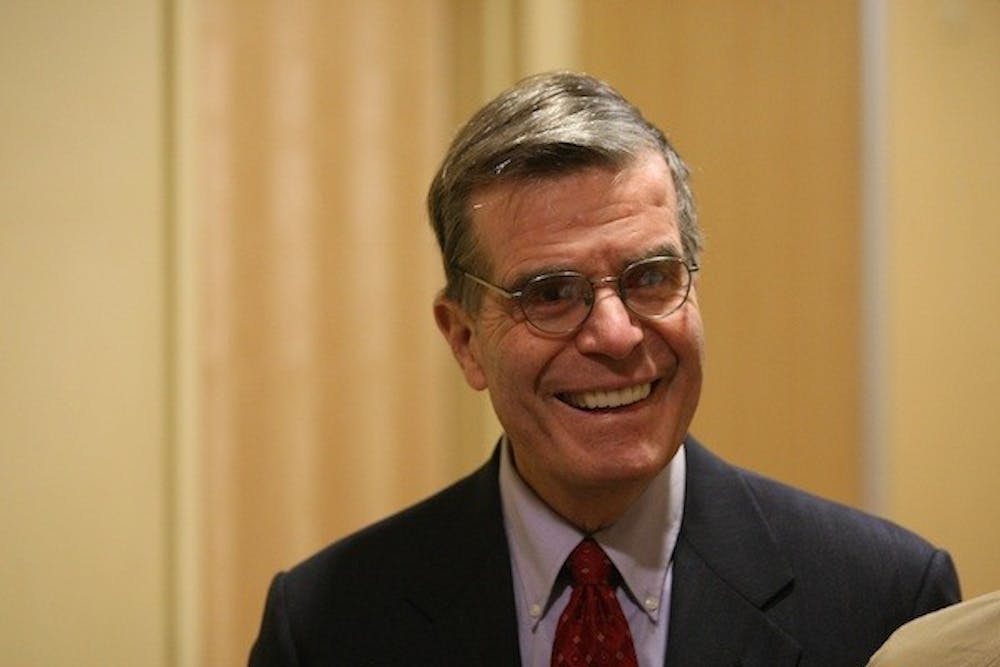Ted Sorensen, a former speechwriter for and adviser to President John F. Kennedy, reflected on Kennedy’s presidency and the art of speechwriting Tuesday night.
Sorensen spoke in the Mary Graydon Center University Club at a College Democrats event co-sponsored by the Student Government and the AUCC.
“It’s my pleasure to be back at American University, with which I have a close connection and very fond memories going back to John F. Kennedy’s commencement speech here on June 10, 1963,” Sorensen said in an exclusive interview with The Eagle. “[It] was the most important and the best speech he ever gave.”
| An interview with Ted SorensenHOWIE PERLMAN / THE EAGLE |
When Kennedy found out AU’s commencement was scheduled at around the time Soviet Premier Nikita Khrushchev would need a positive sign from the United States for him to pursue a peaceful path, Kennedy decided he would make the speech at AU, Sorensen said.
Sorensen developed his speechwriting capabilities in part through reading Shakespeare, speeches by Winston Churchill, passages from the Bible, and sections from a volume of the world’s greatest orations, he said. Sorensen later gave the volume to Kennedy after they had been working together for a year or two.
He also improved his speechwriting by being a part of debate teams in high school and college, Sorensen said.
“Speechwriting is easy; it’s just a matter of a few lines,” Sorensen said. “One: the outline. Two: the headline. If you were writing a news report of your speech, what would the headline be? Number three: the top line—start off with a bang. Number four: the bottom line —end with something memorable. And after that, throw in some sidelines. Put a little poetry here and there, some jokes, some quotations, and some historical anecdotes to bring color and flavor.”
Max Paul Friedman, an associate professor of history in the College of Arts and Sciences who interviewed Sorensen during the event, said Sorensen could inspire students attending the discussion.
“Part of what happens at events in and out of the classroom is not so much transmitting information as it is inspiring people with an interest in further learning,” Friedman said. “I would expect that anyone who sat in this room tonight would have rekindled and encouraged their interest in learning about this period of America’s past and knowing more about the Kennedy administration.”
Sorensen said both he and Kennedy had to approach the Cuban Missile Crisis in 1962 carefully because of the threats it posed.
“Kennedy had realized that political problems, for the most part, don’t have military solutions,” he said. “And so, in the Cuban Missile Crisis, as surprised and angry as he was that Khrushchev had put nuclear weapons outside the Soviet borders, he did not bomb those missiles. Instead, he adopted a course that put the choice of escalation and humiliation up to Khrushchev, by adopting a quarantine around Cuba.”
Sorensen also spoke about his own role during the crisis.
“As a 34-year old kid from Nebraska being asked to draft a letter to the Soviet chairman on behalf of the president of the United States at a time when the whole world teeters on the brink of destruction—that was my most dramatic, high-pressure moment,” he said.
Bo Hammond, the president of AU’s College Democrats chapter and a junior in the College of Arts and Sciences, said AU students could learn from Sorensen’s experiences.
“The students of American University benefited greatly from hearing a man who is dedicated to the making of history and the conduct of the public’s business,” he said. “Whether we study government or history or international affairs, Mr. Sorensen has experience and wisdom that can help us all.”
SG President Andy MacCracken said Sorensen’s connection with AU helps symbolize the university as a center of service.
“We have successful service initiatives coming out of here and successful leaders in service and public service,” MacCracken said. “The significance of having Mr. Sorensen back here again just reaffirms that he is a friend of the university.”
Sorensen delivered the May 11, 2003 commencement address for the School of Public Affairs and School of International Service. Sorensen followed in Kennedy’s footsteps by delivering a commencement speech at AU almost 40 years after Kennedy’s June 10, 1963 commencement speech.
Sorensen was also the first speaker hosted by the Kennedy Political Union.
You can reach this staff writer at hperlman@theeagleonline.com.





